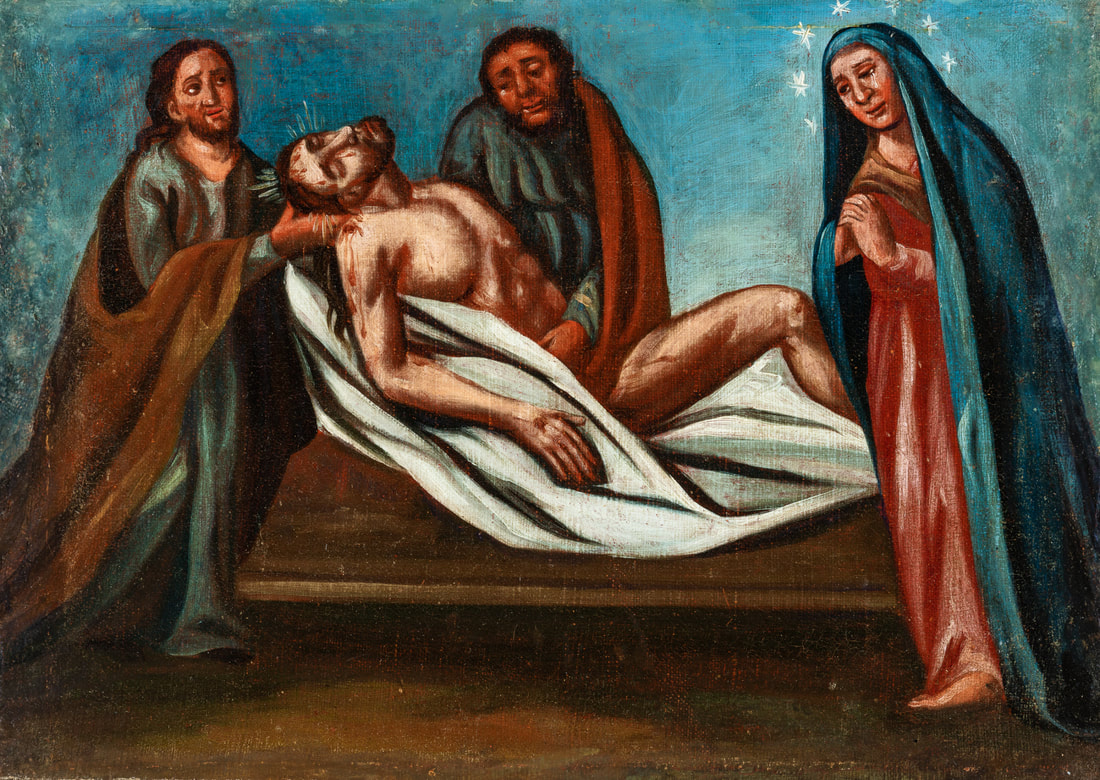Holy SaturdayThroughout the year, the Southern New England Conference of the United Church of Christ reproduces the Daily Lectionary for use by churches. These are the suggested readings for April 16th, Holy Saturday: Job 14:1-14 or Lamentations 3:1-9, 19-24; Psalm 31:1-4, 15-16; Matthew 27:57-66 or John 19:38-42; and 1 Peter 4:1-8. I would encourage you to read these short selections as part of your Lenten practice.
Today is the last day of Lent. On Good Friday, Jesus died on the cross, His corpse was removed and placed rather unceremoniously in a nearby tomb, and it was left there. The story of Jesus of Nazareth seemed to have reached its end in the darkness of that tomb. The next day was the sabbath within the celebration of Passover. According to Mosaic Law, all work ceased. It was a day of rest. The body continued to lay lifeless in the darkness of the tomb. This is the only Gospel account of Jesus being passive, and there could be significant meaning in this. Jesus may have “emptied himself” of the signs of His divinity as it says in Philippians, but not of divinity itself. It’s as if a king were to walk among his people dressed as a commoner as told in fables and Hollywood, but he still remains the king. God, in and through Jesus, experiences the reality of death and separation. On Holy Saturday, as Jesus lies dead in the tomb, God knows what lifelessness is. As Jesus lies in the tomb, God knows the pain and sorrow of separation. In the book “The Crucified God,” Jurgen Moltmann argues that such things do not infringe upon the omnipotence of God when God chooses to allow such things. When God chooses to enter our world as one of us and empties Himself of the privileges of divinity, this plays out throughout the life of Jesus, which includes the death of Jesus on the cross, which includes the passivity of lying dead in the dark tomb. We cannot know the thoughts and feelings of God. It would be presumptuous to even dare to imagine we could, but we can play forward what God reveals of Himself in and through Jesus. The reality of Jesus’ human nature need not end in the tomb. God, in and through Jesus, has experienced human life, and therefore, it may not be beyond the pale to posit that God, in and through Jesus, also has experienced death. And this is where Lent ends, in the passivity of Jesus’ dark tomb. As Christians in 2022, it is impossible to separate Lent from Easter, but if we try, we can foster a better sense of the power of the cross and the tomb, and from this place of despair we can then share more joyfully in the wonder and hope and triumph that is the unexpected Easter. I pray that our Lenten journeys have been meaningful and also challenging. I hope in the words of today’s last Bible selection of Lent that these 46 days (40 days of Lent plus six Lenten Sundays) have prepared us “so as to live for the rest of your earthly life no longer by human desires but by the will of God.” And where Lent ends, Easter begins. Please know that whoever you and wherever you may be on your spiritual journey, you are invited to join us as we announce and celebrate the empty tomb tomorrow first at our Sunrise Service at 6AM and then in church at our regular time. Let us proclaim together as church that Christ is risen. Christ is risen indeed. Alleluia. Amen. If you’d like, here is the link to the Southern New England Conference’s daily reading schedule: www.sneucc.org/lectionary.
0 Comments
Leave a Reply. |
NewsFaith, love and chitchat. Categories
All
Archives
June 2024
Follow
|
|
SERVICE TIMES
Sunday 9:30-10:30am Children Sunday School 9:30-10:30am Nursery care available during worship DONATE Make a single or recurring contribution by clicking here |
FOLLOW
|

 RSS Feed
RSS Feed
